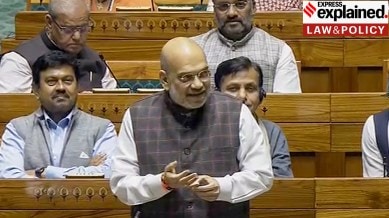Revised criminal reform Bills in Parliament: What has changed, and why
The Centre had introduced Bharatiya Nyaya Sanhita, 2023; Bharatiya Nagarik Suraksha Sanhita, 2023; and Bharatiya Sakshya Bill, 2023 in August. Now, their revised versions have been brought in. Here's why

The Centre introduced three revised criminal reform Bills in Lok Sabha on Tuesday, withdrawing the previous versions, introduced in August this year.
On August 11, Union Home Minister Amit Shah had introduced three Bills in Lok Sabha to replace the Indian Penal Code (IPC), 1860; the Code of Criminal Procedure, 1973 (originally enacted in 1898); and the Indian Evidence Act, 1872. The new bills—Bharatiya Nyaya Sanhita (BNS), 2023, to replace the IPC; Bharatiya Nagarik Suraksha Sanhita (BNSS), 2023, for CrPC; and Bharatiya Sakshya (BS) Bill, 2023, for the Indian Evidence Act—were subsequently referred to a standing committee the same day.
The committee, headed by BJP MP Brij Lal, proposed several key changes to the Bills. Subsequently, the Centre re-introduced the revamped criminal law Bills in Parliament’s winter session. However, several recommendations have gone unconsidered in the new Bill.
What were the committee’s suggestions, and what has changed now?
Handcuffs
The use of handcuffs, as allowed in Clause 43(3) of the BNSS, to prevent the escape of individuals accused of serious offences and ensure the safety of police officers and staff during arrests, was welcomed by the Parliamentary Standing Committee on Home Affairs. However, the panel suggested that this should be restricted to select heinous crimes like rape and murder rather than be extended to persons committing “economic offenses.”
This is because the term “economic offences” encompasses a wide range of offences, from petty to serious, and therefore, it may not be suitable for blanket application of handcuffing in all cases falling under this category. “The committee, therefore, recommends that Clause 43(3) may be suitably amended to delete the words ‘economic offences’ from the clause,” the panel said in its report.
Additionally, Clause 43(3) of the erstwhile BNSS permitted the use of handcuffs while arresting habitual offenders who escaped from custody or those committing specific offences like human trafficking and counterfeiting, among others.
What changed: The parliamentary panel’s recommendation to delete “economic offences” from this provision has been incorporated in the new Bill.
Although the earlier BNSS had an extra line on offences against the state to include those that endanger the country’s sovereignty, integrity, and unity, the new provision simply mandates using handcuffs for committing an “offence against the state.” This could mean that the use of handcuffs for arresting people committing such offences has been made more discretionary.
In addition, the new provision extends the use of handcuffs to persons being produced before a court as well.
Mercy Petitions
Clause 473(1) of the erstwhile BNSS allowed convicts undergoing death sentences or their legal heirs or relatives to file mercy petitions while providing the procedure and time frame for the same.
After being informed by jail authorities about the disposal of the petition of a convict sentenced to death, he, his legal heir, or a relative can submit a mercy petition within 30 days to the Governor. If rejected, the person can petition the President within 60 days. No appeal against the order of the President shall lie in any court.
The earlier provision also said that prior to submitting the plea before the Governor or the President, it may be presented to the Centre or the state government’s Home Department.
However, the panel suggested constituting a quasi-judicial board to deal with commutation and remission matters rather than leaving such judicial functions to the Executive’s discretion. It also proposed that a time frame be provided within which mercy petitions would be heard.
What changed: Besides changing the provision’s numbering from clause 473 to 472, the new Bill has deleted the provision that allowed mercy petitions to be forwarded to the Home Department of the state government or the Centre for review.
Although Clause 473(7) said, “No appeal shall lie in any Court against the order of the President made under article 72,” the modified Clause 472(7) makes the Governor’s orders under Article 161 unappealable, thereby broadening the scope of what cannot be challenged.
Preventive detention powers
Clause 172(2) of the BNSS expanded the police’s powers while taking preventive action. It allowed police officers to detain or remove persons resisting, refusing, ignoring, or disregarding to conform to any direction given by them under sub-section (1) and take them before a Judicial Magistrate or, in petty cases, release them “when the occasion is past.”
However, the panel suggested that the time period for such detention should be specified, and the words “release him when the occasion is past” need to be clarified to remove ambiguity.
What changed: The new Bill adds a time limit to this provision. It says the person detained may be taken to a magistrate or, in petty cases, be released as soon as possible, within 24 hours. Moreover, “judicial magistrate” in the old BNSS has been replaced by “Magistrate” now.
Community Service
The erstwhile BNSS had included “community service” as a penal measure for offences like attempting suicide, restraining exercise of lawful power theft, defamation of public functionaries, and appearing in public places while intoxicated and causing annoyance. However, it was silent on the definition of “community service.”
What changed: The explanation to Clause 23 of the new BNSS defines “community service” to mean work which the Court may order a convict to perform as a form of punishment that benefits the community, for which he shall not be entitled to any remuneration.
The Bill also adds community service as punishment for unlawfully engaging public servants in trade and non-appearance in response to a proclamation under Section 84.